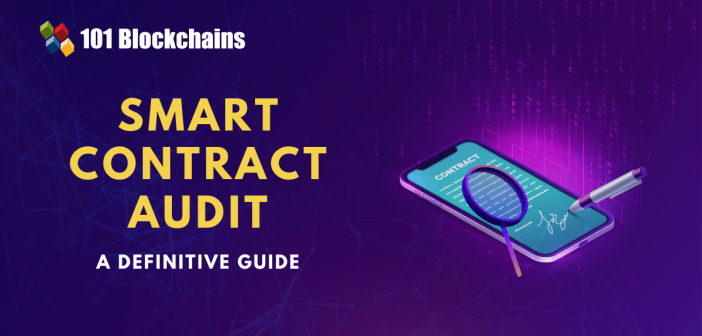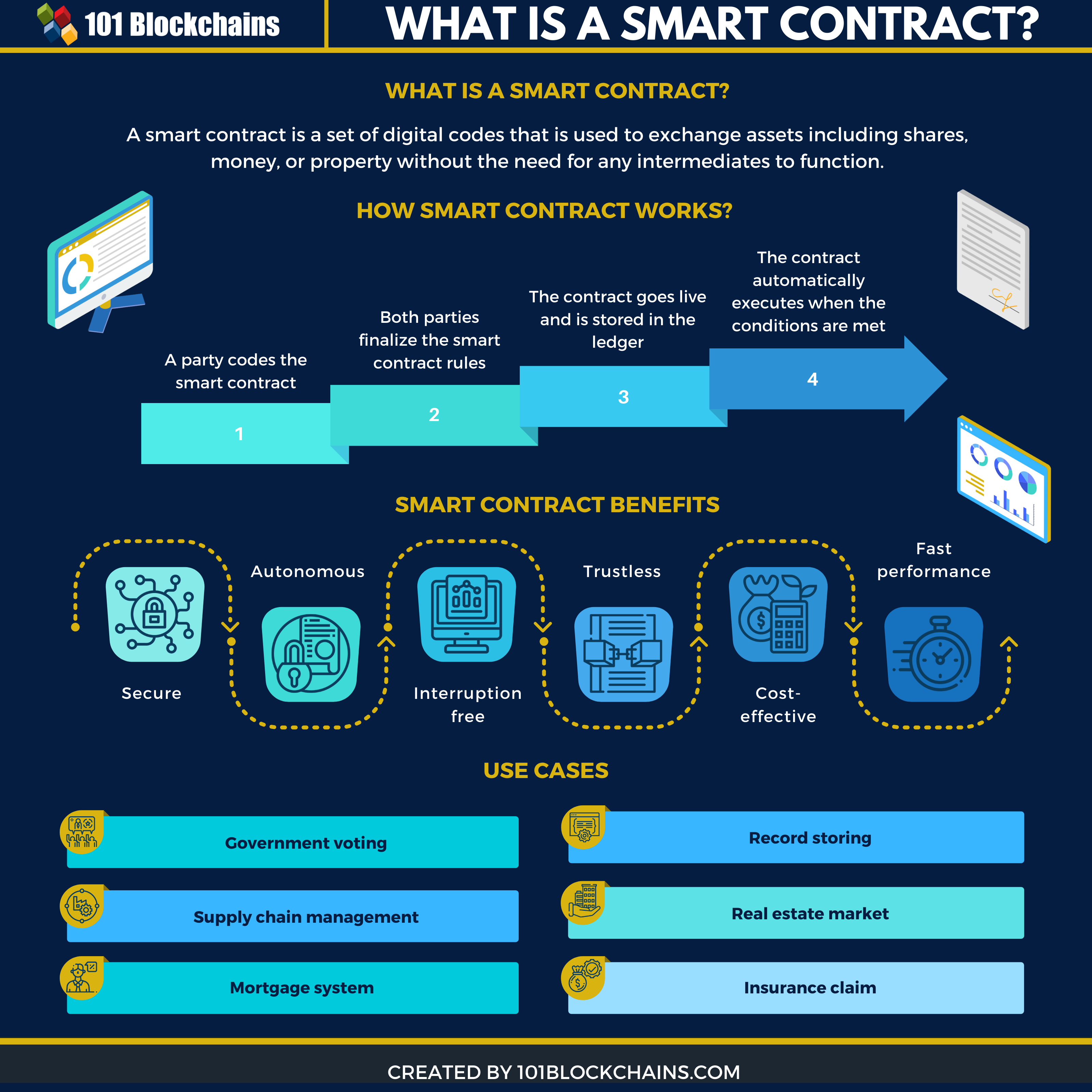Learn how blockchain truly works, master key definitions, and uncover what makes smart contracts so "smart." Dive into the fundamentals, gain valuable insights, and start your blockchain journey today!

- Solidity & Smart Contracts
Gwyneth Iredale
- on September 17, 2021
What is a Smart Contract Audit?
Do you know the importance of smart contract audits in finding the security vulnerabilities in smart contracts? Dive in to learn about the smart contract audit!
Blockchain technology has undoubtedly revolutionized many industries. However, the hacks and exploits of many renowned blockchain applications have created notable setbacks for the long-term growth of blockchain. Well, blockchain was basically focused on offering optimum levels of security, wasn’t it? When you take a look at the Ethereum blockchain network, it has massive computing power for ensuring security. However, blockchain networks can be secure, while applications running on them might not be as secure as expected.
Blockchain applications use smart contracts for interacting with the blockchain, and smart contracts have profound security vulnerabilities. This is where you need a smart contract audit. You might be wondering about the definition of auditing a smart contract and the resources you need for the same. The following discussion offers you a detailed guide on smart contract auditing with an outline of its definition, types, and processes.
Curious to understand the complete smart contract development lifecycle? Enroll in Smart Contracts Development Course Now!
What are Smart Contracts?
Before finding out how to audit a smart contract, let us have a brief understanding of smart contracts. Smart contracts are computerized transaction protocols tailored for executing the terms of a contract. Primarily, smart contracts are tailored for addressing common contractual conditions while reducing accidental exceptions and the involvement of intermediaries.
Presently, smart contracts are serving a wide range of use cases such as supply chain management, ICOs, and electoral voting. So, where is the problem? Just like any other software, smart contracts come with security vulnerabilities. Therefore, a smart contract audit is necessary for ensuring that smart contracts are free of any security issues. At the same time, the auditing also ensures that the smart contracts are optimized for ensuring ideal levels of performance.
To know more about smart contracts and their benefits, check out the detailed graphic below-

Please include attribution to 101blockchains.com with this graphic. <a href='https://101blockchains.com/blockchain-infographics/'> <img src='https://101blockchains.com/wp-content/uploads/2020/08/what-is-a-smart-contract-1.png' alt='what is a smart contract='0' /> </a>
Definition of a Smart Contract Audit
The foremost aspect of understanding the smart contract auditing process is its definition. The audit process for a smart contract focuses on scrutiny of the code used for underwriting the terms and conditions in the smart contract. With the help of such an audit, smart contract developers could easily identify the vulnerabilities and bugs before the deployment of smart contracts.
Generally, third-party entities carry out smart contract audits to ensure a thorough review of the code. On the other hand, enterprises can choose professional, smart contract auditors for carrying out the audit process.
It is quite important to test the code thoroughly before deploying the smart contract. Why? Once you write the smart contract to the blockchain, it is impossible to change the code. Deploying smart contracts without proper audits could result in untoward circumstances such as discrepancies in the desired performance of the contract. At the same time, inadequate audit processes could also land you up with risks such as loss of personal data or data theft.
Importance of Smart Contract Audits
After finding the answer to ‘what is a smart contract audit?’ it is reasonable to look for its significance. Security is one of the formidable concerns for smart contract implementation in present times. The concerns of inefficiency, security issues, and misbehavior could lead to extremely high additional costs in implementing smart contracts on a blockchain network.
Enterprises are troubled regarding smart contract implementation, considering its irreversible nature. Furthermore, you also have the risk of losing the whole contract and associated assets due to security vulnerabilities in smart contracts. Therefore, the smart contract audit becomes an important requirement in present times for the following reasons.
- Better optimization of the code
- Improved performance of smart contracts
- Enhanced security of wallets
- Security against hacking attacks
So, you can clearly notice that smart contract audits can be quite helpful for,
- Decentralized apps product owners
- Individuals who have to gain the trust of investors, stakeholders, contributors, and more
- Creators and organizers of ICO startups
- Smart contract developers
With so many critical advantages for smart contract security, it is important to find out how to audit a smart contract immediately. The skills for auditing smart contracts could help enterprises stay safe from notable security attacks like,
- Reentrancy attack
- Reordering attack
- Short address attack
- Over and underflows
- Replay attack
Wondering about which is the best language for your smart contract? Here we enlist the top 5 programming languages to build your smart contracts.
Basics of Smart Contract Auditing
While you may have started wondering about the smart contract audit cost, it is important to understand the basics first. So, what will be the basic structure for smart contract audits? One of the first areas of focus in the structure of your smart contract audits must refer to common issues such as reentrance mistakes, compilation errors, and stack problems. Another notable area to focus on in smart contract audits refers to the identified errors and security issues in the smart contract host platform. In addition, smart contract auditors should also focus on break testing the smart contract by simulating different attacks on the contract.
Now that you know about the basics needed in smart contract audits, you should know about the types of auditing processes. Auditing for smart contracts is broadly classified into manual code review and automatic code analysis. The manual code review for smart contracts focuses on the team evaluating every line of code to identify any possible compilation, security, and reentrancy issues.
Most importantly, manual code review would place more emphasis on the identification of security vulnerabilities. On the other hand, automatic code analysis for smart contract auditing offers the considerable benefit of time-saving. Furthermore, automatic smart contract code testing also enables improved and comprehensive penetration testing for faster identification of vulnerabilities.
Want to learn more about The Ethereum Technology? Enroll Now: The Complete Ethereum Technology Course
Working of Smart Contract Audits
While you can discover various possible approaches for smart contract auditing across different tools, it is important to know how the audit works. Auditing smart contracts involve an in-depth evaluation of the smart contracts of blockchain applications. The audit focuses on rectifying design issues, security vulnerabilities, and code errors. Professional, smart contract auditors would generally offer you a detailed roadmap for audits to help you understand the process better. Here are some of the best practices you can find in the ideal workflow for smart contract audits.
-
Agreement on Specification
The foremost factor in the process of smart contract auditing focuses on reaching an agreement regarding the specification of smart contracts. The smart contract specification and other related documentation provide a clear explanation for the architecture, build process, and design choices of a project. Generally, you can find the specification documented in the README file of the project.
It is important to note that whitepapers and docstrings can be reliable tools for explaining specific sections of code. However, they do not serve as replacements for a well-documented specification. The lack of a specification would leave auditors without any idea regarding the desired and actual working of the code. Therefore, the first phase of how to audit a smart contract starts with a full specification of the project.
In this stage, auditors would also look for the time of ‘code freeze,’ which would imply the finalization of the code. During the ‘code freeze’ step, the smart contract code must be in the final draft stage. Developers must have made all the possible efforts to identify any abnormalities or undesirable factors in the code.
The specification for the project would also include the final commit hash for ensuring that the auditors and developers have a consensus regarding the code under audit. Developers have to provide the assurance that any changes beyond the ‘code freeze’ point would not come under the audit.
Want to learn about smart contract oracles? Read here for a Smart Contract Oracles – A Comprehensive Guide
-
Testing Process
Without any delay, you can directly proceed to the testing process in smart contract auditing. As a matter of fact, testing is one of the significant factors which maximize the smart contract audit cost. Testing also offers simple and easy approaches for bug detection. You could go with different options such as unit tests for targeting individual functions or integration tests focused on concerns of larger code.
Improved testing coverage could help in reducing the count of bugs that can be eliminated easily. Furthermore, tests also help in ensuring the affirmation of developers regarding the desired functionalities and performance of a smart contract project. In addition, tests also provide the informal documentation of smart contract auditors for offering them additional insights regarding expected project functionalities.
The most easily applicable step in an audit for testing would focus on running a test suite. If the code passes the majority of tests, then you are less likely to find any obvious issues. On the other hand, if the code fails in the tests, auditors would consult with developers and find out if they knew about the failed tests. If the number of failed tests is considerably higher, then it is reasonable to hold the audit process and introduce critical modifications in the codebase before proceeding ahead.
Another important aspect associated with testing in smart contract audit cost refers to line coverage. Auditors have to review the test line coverage by checking the amount of code being subjected to evaluation by tests. Improved test coverage could imply additional tested features, thereby leading to possibilities for limited, unknown vulnerabilities and issues. Many of the quality assurance professionals look at 100% line coverage. However, 85% to 90% of line coverage for each contract works nicely for many projects.
Want to learn more about The Ethereum Technology? Enroll Now: The Complete Ethereum Technology Course
-
Automated Analysis
Once you are done with the testing process, you are likely to move to the analysis stage of the smart contract audit. The demand for secure smart contract codes is increasing considerably in recent times. Therefore, the need for automatic bug detection software is also increasing prominently.
Many symbolic execution tools follow a design that focuses on general vulnerabilities you can discover in Solidity smart contracts. The automated analysis tools could evaluate a program for determining the inputs which trigger the execution of each part of the program. Automated analysis tools in smart contract auditing help in streamlining the audit process by improving the ease of identification of general issues in code.
At the same time, they can also facilitate freedom from depending on human auditors while ensuring reduced turnaround time. The automated analysis allows auditors to focus their efforts on new and complex vulnerabilities.
While automated analysis can definitely streamline the smart contract audit cost, the automated analysis tools for Solidity are presently in the early stages of development. So, it will take a lot of time to achieve the desired perfection for smart contract audits.
Furthermore, automated analysis tools do not have awareness regarding the context of writing a specific piece of code. As a result, such tools could also report false positives frequently alongside incorrectly claiming the existence of issues. At this point in time, you would have to turn towards manual analysis for every identified vulnerability.
If you are new to smart contracts, you might not be sure of their capability. Check out this article on the best smart contract use cases out there to clear your confusion.
-
Manual Analysis
Automated analysis tools in smart contract audits have many advantages. They can help in identifying common smart contract vulnerabilities with ease. On the other hand, they lack in terms of understanding the intention of smart contract developers. Therefore, manual inspection is a necessary requirement for improving the detection of possible smart contract code vulnerabilities.
An experienced auditing team evaluates the specification for confirming the performance of a project according to desired functionalities. Based on their observations, the smart contract auditors can offer reliable recommendations for improvement to the smart contract project team.
-
Audit Report
The final step in smart contract audit is the creation of an audit report. The auditors should create a detailed audit report after completing the tests, automated analysis, and manual analysis processes. Most important of all, the audit team and the project team should sit down to discuss the report’s findings. The discussion could help the project team understand the issues and smart contract vulnerabilities alongside the recommendations of the audit team.
Start learning Smart Contracts and its development tools with World’s first Smart Contracts Skill Path with quality resources tailored by industry experts Now!
Final Notes
On a final note, it is quite clear that smart contract audit could be a promising tool for improving the functionality of smart contracts. What seemed almost impenetrable had some security vulnerabilities in them. The smart contract audit cost might vary considerably according to the platform or tool you select to use.
Many other factors also affect the efficiency of smart contract audits, such as communication between the project team and the audit team. However, enterprises should work on identifying the challenges of smart contract audits to improve their effectiveness in leveraging smart contracts. Learn more about smart contracts and how you can gain value from auditing smart contracts right now!





